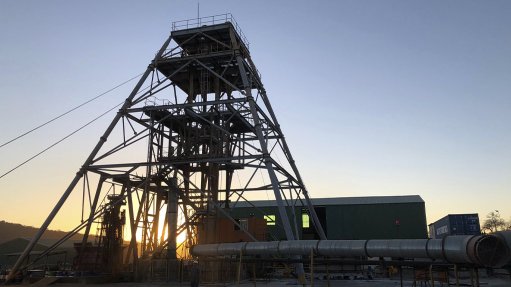
SINKING SUCCESS Caledonia has completed its shaft sinking project at Blanket’s Central shaft
With the expansion of gold miner Caledonia Mining Corporation’s operations, and its intention to increase its stake at its Blanket gold mine, in Zimbabwe, the company aims to focus on obtaining a higher recovered grade.
Caledonia has 49% ownership and operates the Blanket gold mine and has made significant capital investments in its underground and surface facilities.
“Recovered grade remains a high focus for our management teams and, at this stage, the issue of a lower grade is a result of mining dilution, rather than an underlying problem with the geological model,” says Caledonia director and CEO Steve Curtis.
This entails the implementation of steps to improve drilling accuracy that will minimise mining dilution, he mentions.
Curtis says there was a decrease in the recovered grade – along with electricity interruptions during the first seven months of this year – resulting in a reduction in the production guidance from the previous level of 53 000 t to 56 000 t to 50 000 t to 53 000 t for the 2019 fiscal year, he adds.
Further, Caledonia has completed the shaft sinking project at Blanket’s Central shaft, which will provide access to deeper orebodies which have not yet been mined and are generally slightly higher grade. “The inferred grade at depth is currently slightly higher, at about 4.5 g/t, but this may come down as we drill more holes and delineate the resource. Over time this is expected to help us achieve a higher average of 3.7 g/t in comparison to the current 3.1 g/t mined grade.”
Following the completion of the shaft sinking, which is followed by 12 months of equipping, there will be a significant increase in the life of the mine to 2034, based on known drilled resources.
“Were it not for Central shaft and further development, the mine would be in its last few years of life,” Curtis acknowledges.
He explains that the accessible orebodies using the current shaft infrastructure would have been mined out by the end of 2020, but building a new mine below the current infrastructure, through a new shaft, will cater for the deeper extension of current orebodies and this will not interfere with current production.
Further, hoisting capacity and production will be doubled, while economies of scale will help to optimise production and costs.
“Blanket mine will have new shaft infrastructure in place for the next 30 years at the least,” Curtis adds.
Projections
Caledonia released its second quarter results last month. The company produced 12 712 oz of gold in the second quarter, ended June 30 – an increase of 6.4% on the first quarter’s production of 11 948 oz.
The lower on-mine costs and the 30% increase in gross profit to about $7-million this quarter were because of lower electricity costs caused by the depreciation of the Zimbabwe dollar.
Caledonia also intends to increase its ownership of the Blanket gold mine by 15%, to 64%, which is being delayed by the administrative process. “With the amendment of the Indigenisation and Economic Empowerment Act, this transaction was enabled and while we do face delays, it is out of our hands,” Curtis notes.
He believes that gold and gold mining offer substantial potential for growth to the Zimbabwe economy, provided that several changes are implemented.
“The gold mining industry remains critical to the entire country’s economy for the generation of essential foreign exchange.”
Curtis adds that the broader difficulties facing the Zimbabwe economy adversely affect investor confidence, which, in turn, is reducing the available capital for investment in the country, to which Caledonia is not immune.
Further, he states that Zimbabwe is blessed with substantial mineral resources, yet it is one of the most underexplored and undercapitalised mining regions in the world.
“If government were to take the necessary steps to improve investor confidence, specifically the removal of exchange controls and the liberalisation of the foreign exchange market, the industry would be poised for very significant growth.”
Caledonia also intends to expand its investments and interest in Zimbabwe and is primarily looking at brownfield exploration projects in other regions of the country.